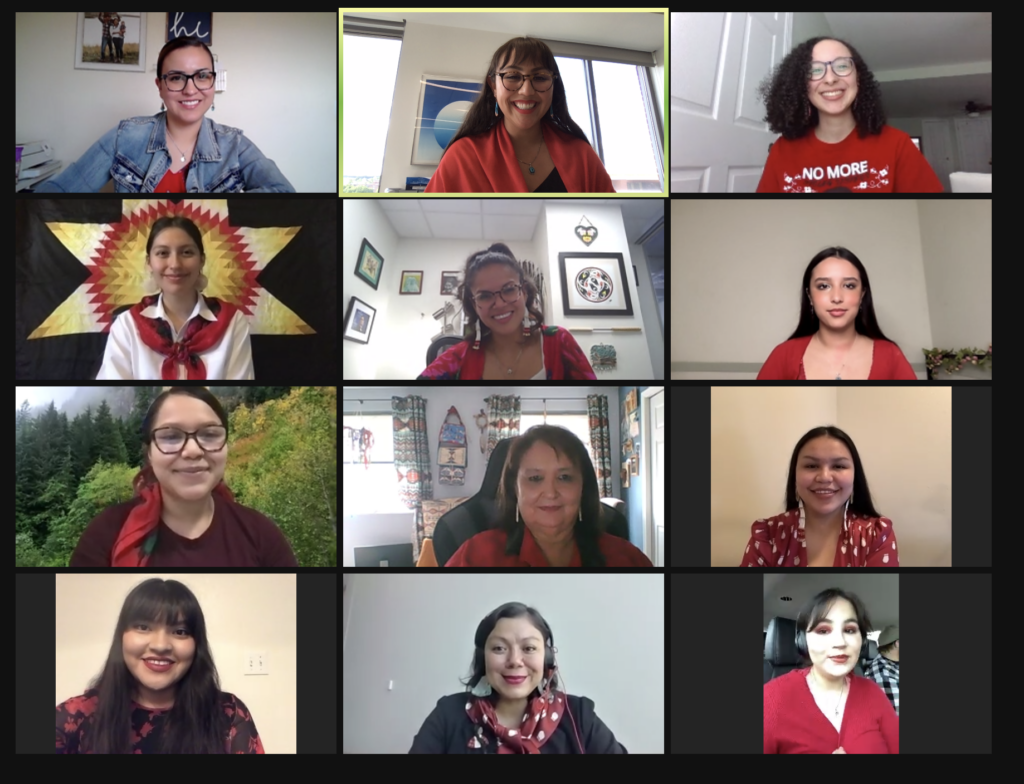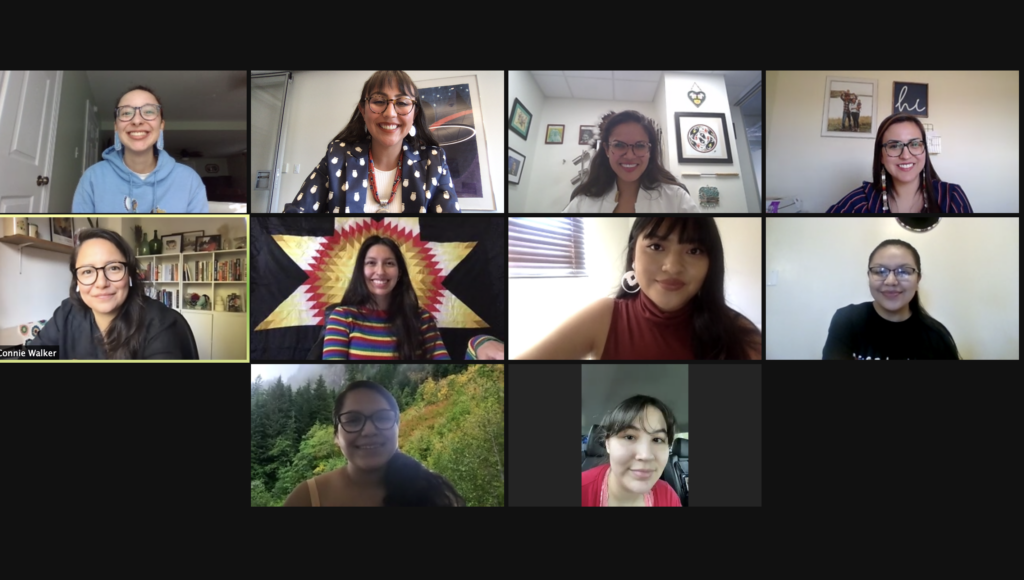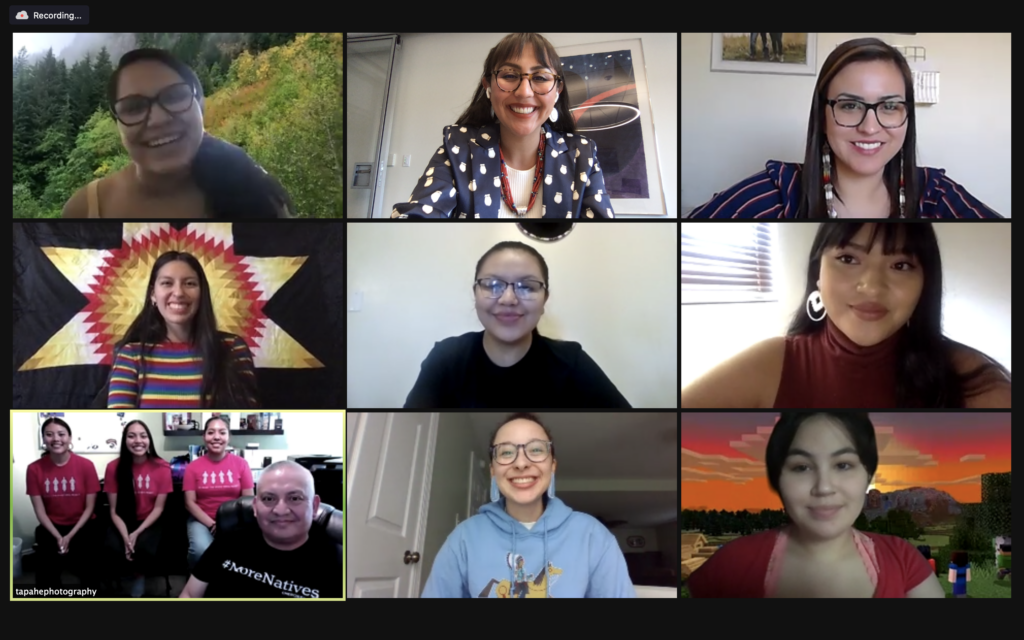May 3-7, 2021 – The Center for Native American Youth (CNAY) virtually gathered the Remembering Our Sisters Fellows to begin their journey in the 6-month fellowship. Throughout the week, Lauren Poterek, Evynn Richardson, Maya Sanchez, Cordelia Falls Down, Gracie Argon, and Lily Painter participated in various training and knowledge sharing sessions led by CNAY staff and various leaders within the Missing and Murdered Indigenous Women Girls and Two Spirit + (MMIWG2S+) movement. Sessions focused on understanding the MMIWGS2+ movement in its entirety, and the many ways to advocate within it, historical trauma, narrative sharing, Indigenous leadership, and enhancing photography, film, podcast and other digital art and storytelling skills.

Monday, fellows started off the week being welcomed by CNAY’s Executive Director, Nikki Pitre (Coeur d’ Alene), and Victim Advocacy Specialist Bonnie Clairmont (Ho-Chunk). Fellows then attended an Understanding of Historical Trauma in the context of Violence Against Women presentation facilitated by CNAY’s Associate Director of Research and Evaluation, Dr. Billie Jo Kipp (Blackfeet). “When we look at who we are as Indian people, we define who we are by the resilience of our ancestors, we don’t define who we are by the bounds of this country, because we know what this country was built on…” said Dr. Kipp. She further mentioned the vitality of including cultural resources in the education of Indigenous children and the essential process of building trusting relationships with them in order to properly support their successes. Historical Trauma has impacted the way in which we move as Indigenous people today and internalized oppression has had lateral impact within Indigenous communities, “When they removed our language, they removed our culture,” Dr. Kipp continued “which ultimately lead to negative self-behaviors.” She then opened up about some of her own experiences and ended with providing the fellows with tools that they may utilize to combat historical trauma so they may continue the process of healing.
Tuesday, the welcoming began with words from Jillene Joseph (Gros Ventre) Executive Director of the Native Wellness Institute. Jilllene shareda beautiful story about the buffalo and their instinct to take care of one another.,“Like the buffalo, sometimes our sisters go down, and we have to circle them and lift them back up,” said Jillene, “and sometimes we are the ones that go down, and we have to allow our sisters to circle us and lift us back up.” After the inspirational story of the resiliency of our four-legged relatives, the focus shifted to The Power of Your Story & Indigenous Leadership facilitated by CNAY’s Nikki Pire and Jennifer Peacock. During this session, fellows participated in more personal conversation regarding who they are, what their goals were, and how they planned to become the leader they are capable of being.
Wednesday was a day of inspiring guests, including Lisa Meeches, (Ojibway from Long Plains First Nation), North Dakota Representative Ruth Buffalo (Mandan Hidatsa and Arikara Nation), and Isabella Madrigal (Cahuilla Band of Indians and Turtle Mountain Chippewa). Lisa, a writer and producer,shared her international film and television work, along with the power she draws on that allows her to be a strong voice for Native women. “You can live in the city centers and hold your degrees with your arms, but always carry your bundle in the other, always carry your grandmothers close by,” said Lisa.
Isabella Madrigal and Representative Buffalo shared a space together. Isabella sharedher story of how she combined her passion of theatre with her love for her community and people. She said, “Something that was neat, was realizing how timeless a lot of these traditional teachings and stories can be, and how applicable they are, even today.” Isabella allowed her cultural teachings and stories to guide her in the process of writing and creating a theatre production on Missing and Murdered Indigenous Women. Representative Buffalo continued the conversation sharing her journey in advocacy work within movement. In 2019 Ruth introduced two bills related to Missing and Murdered Indigenous People (MMIP) in North Dakota. Ruth reminded the fellows that when doing this work, it is vital to check-in with themselves. She said, “Always being on the go and being so busy, a lot of things get neglected in terms of self-care, like drinking water, or getting enough rest, even doing a fast from the news or social media is helpful. Anything that is going to help protect your well-being mental, physically, emotionally, spiritually.”
Thursday fellows shared space with journalist Connie Walker (Cree Okanse First Nation) and photographer Eugene Tapahe (Navajo). These conversations focused on using storytelling and media to bring awareness.

Connie shared how news outlets have ignored Native issues, and how reporting on these issues can even bring about internalized racism against Indigenous people doing more harm than good. “We need to be supported to tell our own stories, and we need to demand that support in all of these spaces that we have been underrepresented in and ignored in,” said Connnie.
Eugene shared his creation “Art Heals: The jingle Dress Project”. The goal of his project is to take the jingle dress to the land and heal the people while bringing awareness to the MMIWG2S+ epidemic. He says the dancers a part of his project wish to be the voice for the voiceless. When outlets reach out to help Eugene tell his story, he ensures that his voice is heard. “ If we’re going to do this, we’re going to do this right,” Eugene tells reporters. As Native people it’s important to demand that the story be told right before allowing others to be a part of telling our story. “What is it that you’re going to share? The best stories that are told are the stories that are from your heart and stories that mean something to you,” Eugene told the fellows.

Friday was the final day of the week and fellows were given a chance to learn more about filmmaking from Indigenous reporter and filmmaker, Tsanavai Spoonhunter (Northern Paiute, Lakota, and Northern Arapaho). Tsanvai shared her experiences and the framework to creating a story. In sharing her motivation to reclaim the narrative of Indigenous people, Tsanavi said, “…In the film industry, in Hollywood, and journalism in general they often stereotype our peoples and that kind of storytelling even affected me growing up, people automatically had this idea of who I am because I’m a Native person,” She shared films she has helped to create and the process of their creation. She also shared the importance of self-care and setting boundaries while working on projects, emphasizing that the stories they plan to share often bare weight.
Fellows wrapped up the week sharing what they had learned and how they will utilize that to move forward in creating their MMIWG2S+ awareness projects. Fellows shared their initial project ideas, which are set to be complete by late fall 2021. We look forward to sharing them with all of you!

